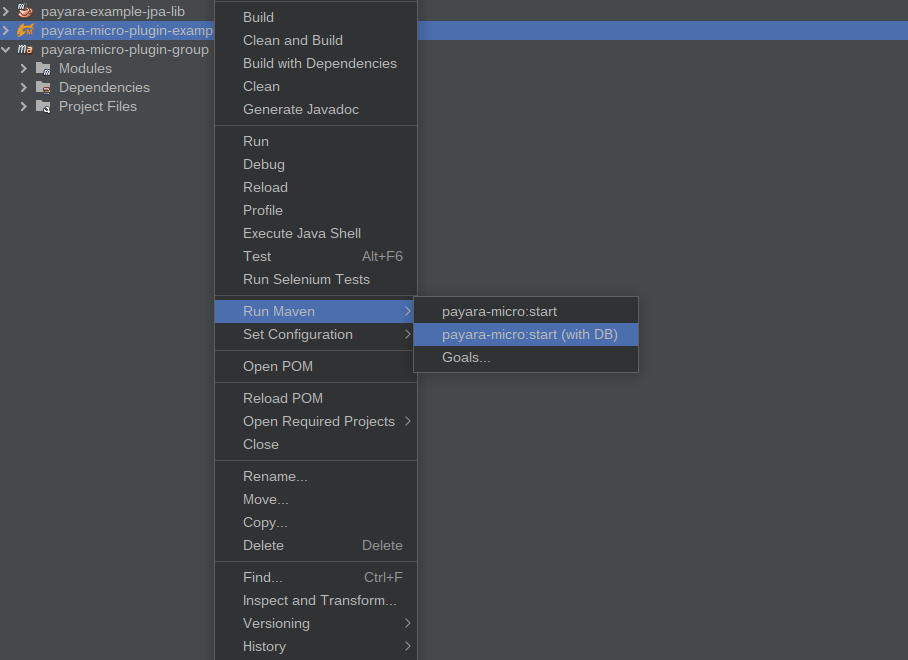The plugin payara-micro-maven-plugin won't run with Java 18, so if that's your default, and you fail to instruct the plugin on how to locate Java 11/1.8, EclipseLink and other libraries will fail with something like:
[2022-05-11T09:54:58.362-0400] [] [SEVERE] [] [org.eclipse.persistence.session./file:/path/to/payara-micro-plugin-group/payara-micro-plugin-example/target/payara-micro-plugin-example-1.0.0-SNAPSHOT/WEB-INF/classes/_MyAppPU.metadata] [tid: _ThreadID=1 _ThreadName=main] [timeMillis: 1652277298362] [levelValue: 1000] [[
The java.lang.Object class was compiled with an unsupported JDK. Report this error to the EclipseLink open source project.
java.lang.ArrayIndexOutOfBoundsException: Index 8 out of bounds for length 0
at org.eclipse.persistence.internal.libraries.asm.ClassReader.readUnsignedShort(ClassReader.java:3573)
[2022-05-11T09:54:58.364-0400] [] [WARNING] [] [org.eclipse.persistence.session./file:/path/to/payara-micro-plugin-group/payara-micro-plugin-example/target/payara-micro-plugin-example-1.0.0-SNAPSHOT/WEB-INF/classes/_MyAppPU.metadata] [tid: _ThreadID=1 _ThreadName=main] [timeMillis: 1652277298364] [levelValue: 900] [[
The java.lang.String class was compiled with an unsupported JDK. Report this error to the EclipseLink open source project.
java.lang.IllegalArgumentException: Unsupported class file major version 62
at org.eclipse.persistence.internal.libraries.asm.ClassReader.<init>(ClassReader.java:196)
[2022-05-11T09:54:58.372-0400] [] [WARNING] [] [org.eclipse.persistence.session./file:/path/to/payara-micro-plugin-group/payara-micro-plugin-example/target/payara-micro-plugin-example-1.0.0-SNAPSHOT/WEB-INF/classes/_MyAppPU.metadata] [tid: _ThreadID=1 _ThreadName=main] [timeMillis: 1652277298372] [levelValue: 900] [[
The java.lang.Long class was compiled with an unsupported JDK. Report this error to the EclipseLink open source project.
java.lang.IllegalArgumentException: Unsupported class file major version 62
at org.eclipse.persistence.internal.libraries.asm.ClassReader.<init>(ClassReader.java:196)
[2022-05-11T09:54:58.379-0400] [] [WARNING] [] [org.eclipse.persistence.session./file:/path/to/payara-micro-plugin-group/payara-micro-plugin-example/target/payara-micro-plugin-example-1.0.0-SNAPSHOT/WEB-INF/classes/_MyAppPU.metadata] [tid: _ThreadID=1 _ThreadName=main] [timeMillis: 1652277298379] [levelValue: 900] [[
The java.lang.Number class was compiled with an unsupported JDK. Report this error to the EclipseLink open source project.
java.lang.IllegalArgumentException: Unsupported class file major version 62
at org.eclipse.persistence.internal.libraries.asm.ClassReader.<init>(ClassReader.java:196)
To avoid that, there are two ways to specifiy the correct Java version to use when launching Payara Micro.
One solution is to add the plugin option to the plugin's configuration:
<configuration>
<useUberJar>false</useUberJar>
<contextRoot>/myapp</contextRoot>
<payaraVersion>${version.payara}</payaraVersion>
<deployWar>false</deployWar>
<javaPath>/usr/lib/jvm/java-1.8.0-openjdk-amd64/jre/bin/java</javaPath>The problem with this solution is that if hardcodes the Java path, and makes it rigid when dealing with CD/CI builders or other development/developer machine. For example, different developers running Windows, MacOS or Linux.
The preferred solution is to use Apache Toolchains. This requires configuring a .m2/toolchains.xml file, and referencing those configurations from the project pom.xml.
To make things easier, I supplied a template toolchains.xml that you can copy to your user's .m2 directory. You'll just need to update it's contents accordingly.
If you look in payara-micro-plugin-example/pom.xml, you'll see a reference to the toolchain:
<plugin>
<groupId>org.apache.maven.plugins</groupId>
<artifactId>maven-compiler-plugin</artifactId>
<version>3.10.1</version>
<configuration>
<source>1.8</source>
<target>1.8</target>
</configuration>
</plugin>
<plugin>
<groupId>org.apache.maven.plugins</groupId>
<artifactId>maven-toolchains-plugin</artifactId>
<version>1.1</version>
<executions>
<execution>
<goals>
<goal>toolchain</goal>
</goals>
</execution>
</executions>
<configuration>
<toolchains>
<jdk>
<version>1.8</version>
<vendor>openjdk</vendor>
</jdk>
</toolchains>
</configuration>
</plugin>Update the contents to nbactions.xml with the proper database connection details.
Launch the web project payara-micro-plugin-example using Netbeans (see contents of nbactions.xml to change the database values) by right-clicking on the web project and selecting Run Maven -> payara-micro:start (with DB):
Alternatively, use the terminal, changing the values as required:
DATABASE_USER=user \
DATABASE_PASS=password \
DATABASE_NAME=MY_DB_NAME \
DATABASE_SERVER=localhost \
DATABASE_SERVER_PORT=1234 \
JAVA_HOME=/usr/lib/jvm/java-1.8.0-openjdk-amd64 \
M2_HOME=/usr/share/maven \
/usr/share/maven/bin/mvn toolchains:toolchain payara-micro:startThe database connection is created via payara-micro-plugin-example/src/main/webapp/WEB-INF/payara-resources.xml, where the connection details are plucked from environment variables passed on the commandline.
<?xml version="1.0" encoding="UTF-8"?>
<!DOCTYPE resources PUBLIC "-//Payara.fish//DTD Payara Server 4 Resource Definitions//EN" "https://raw.githubusercontent.com/payara/Payara-Server-Documentation/master/schemas/payara-resources_1_6.dtd">
<resources>
<jdbc-resource pool-name="ServicesDB" jndi-name="java:app/jdbc/services-myapp" enabled="true" ></jdbc-resource>
<jdbc-connection-pool datasource-classname="com.microsoft.sqlserver.jdbc.SQLServerDataSource"
name="ServicesDB"
res-type="javax.sql.DataSource"
is-connection-validation-required="true"
connection-validation-method="table"
validation-table-name="sys.tables"
fail-all-connections="true">
<property name="User" value="${ENV=DATABASE_USER}"></property>
<property name="Password" value="${ENV=DATABASE_PASS}"></property>
<property name="DatabaseName" value="${ENV=DATABASE_NAME}"></property>
<property name="ServerName" value="${ENV=DATABASE_SERVER}"></property>
<property name="PortNumber" value="${ENV=DATABASE_SERVER_PORT}"></property>
</jdbc-connection-pool>
</resources>
Note that the location of both pre-boot-commands.txt and post-boot-commands.txt are located in ${project.basedir}/src/main/resources/.
You can add all payara-micro cli commands under <commandLineOptions>.
<plugin>
<groupId>fish.payara.maven.plugins</groupId>
<artifactId>payara-micro-maven-plugin</artifactId>
<version>1.4.0</version>
<configuration>
<useUberJar>false</useUberJar>
<contextRoot>/myapp</contextRoot>
<payaraVersion>${version.payara}</payaraVersion>
<deployWar>false</deployWar>
<artifactItem>
<groupId>fish.payara.extras</groupId>
<artifactId>payara-micro</artifactId>
<version>${version.payara.micro}</version>
</artifactItem>
<javaCommandLineOptions>
<option>
<value>-Xdebug</value>
</option>
</javaCommandLineOptions>
<commandLineOptions>
<option>
<key>--autoBindHttp</key>
</option>
<option>
<key>--nocluster</key>
</option>
<option>
<key>--port</key>
<value>8095</value>
</option>
<option>
<key>--prebootcommandfile</key>
<value>${project.basedir}/src/main/resources/pre-boot-commands.txt</value>
</option>
<option>
<key>--postbootcommandfile</key>
<value>${project.basedir}/src/main/resources/post-boot-commands.txt</value>
</option>
<option>
<key>--deploy</key>
<value>${project.build.directory}/${project.build.finalName}</value>
</option>
</commandLineOptions>
</configuration>
</plugin>